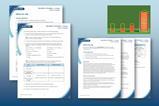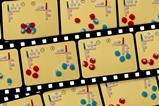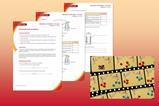How this recognition benefits you as a teacher, and your pupils’ learning
‘What is CSciTeach?’ and ‘What is it for?’ have been common questions from colleagues and students over the last year. The short answers are professional recognition of your skills, knowledge and understanding as a science teacher, and your own development. The long answers are …
When I first found out about Chartered Science Teacher status, I was well into my second decade of teaching. Looking at the criteria, I realised this was a great opportunity to gain professional recognition and demonstrate my passion for my subject.

I believe the teaching profession needs to recognise teachers who have gone above and beyond to improve outcomes for their students. Achieving CSciTeach status means the teacher has taken every effort to improve their subject knowledge, support their students, maintain CPD, develop resources and support other colleagues. This evidence is also relevant in demonstrating teacher competencies and links to the Teachers’ Standards.
How do you get it?
There were three routes open to me as a member of the ASE, the RSC and the Chartered College of Teaching and I decided that the ASE option would be more suitable than the CCT course. Both the ASE and RSC routes provide a chartered status specific to science teaching, while the CCT course is more general. Personally, the specificity of the CSciTeach was a selling point for me.
Was it worth it?
Putting together a portfolio of evidence while teaching a full timetable was a challenge, more so than completing a masters or putting together evidence for a Threshold application. It helps to have a mentor who can guide you through the chaos and has good knowledge of your own achievements; the ASE provides guidance on choosing a mentor. I chose a colleague with extensive experience of leading teams (thank you, Shaun Smithson!). I also had sound advice from Rob Butler (@cleverfiend) who is a fount of knowledge for all things chartered.
I am proud that my achievements were recognised by an external, independent panel of experts. The process has made me evaluate outcomes and I feel that my teaching has developed more over the last few years. I have learned much through my own CPD, meeting like-minded colleagues and following discussions on social media (#ASEchat, #CogSciSci). Keeping CPD records and analysing the impact on my teaching has taught me to consider what CPD will improve the quality of my teaching and therefore improve the outcomes for my students and my colleagues. For example, I have had feedback from students who say that using metacognitive methodology has helped them understand the thought process behind various calculations in A-level chemistry and developing six-mark answers in GCSE physics.
Ultimately, the pleasure at seeing my students finally make progress is evidence of the merits of working towards chartered status
I have become a more reflective teacher through working towards CSciTeach and have found a wealth of knowledge through reading different research articles and books. It has made me think of relevant CPD and how to continuously improve methods of delivery. I have shared these with my colleagues, and these have triggered discussions during science meetings and over lunch conversations. One example encouraged others to trial different feedback techniques which subsequently improved student outcomes.
Analysing student feedback enables me to understand the needs of my students and learn from mistakes. It has also helped me support students in becoming independent learners. Ultimately, the pleasure at seeing my students finally ‘get it’ and make progress, choosing to study chemistry at university or just wanting to prove to themselves that they can improve, is evidence of the merits of working towards chartered status. It also demonstrates to students that education does not stop once exams end. Achieving the CSciTeach made me aim for CChem, which recognises my contributions to the field of chemistry teaching.
Should you apply?
Whether you are considering progression along the leadership route or not, I would recommend applying for Chartered Science Teacher status. Completing the five sections makes you pinpoint steps that have helped you develop as a teacher and build leadership skills, self-evaluation, collegial activity and personal responsibility. Personally, I believe this confirms your commitment to the teaching profession and your subject.
Ready to apply?
If you are a member of the Royal Society of chemistry, start your application today.
Alternatively, read the Science Council’s information.
Want to inspire your learners to consider a career in science teaching? Share this job profile with them.














No comments yet